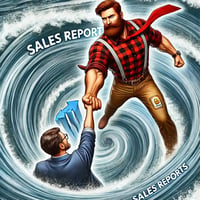Ask any SMB leader about forecasting, and you’ll see the same reaction: a wince, a sigh, maybe even...
Reporting Isn’t a Dashboard Problem
Inbound brought a fresh batch of shiny new reporting workspaces and views in HubSpot. They look slick, they’re easy to navigate, and yes-they’ll make leadership decks prettier.
But let’s cut through the noise: your reporting problem isn’t the dashboard. It’s the data feeding it.
You don’t fix bad inputs with better charts.
The Common Pitfalls
Most SMBs struggle with the same core issues:
-
Deals that should’ve closed are still sitting open. “Just in case” deals linger for months, inflating the pipeline and tanking forecast accuracy.
-
Sales stages mean different things to different reps. For one, “Proposal Sent” means a PDF emailed. For another, it means an actual conversation happened. That inconsistency makes the reporting useless.
-
Close dates are more wishful thinking than reality. Reps pick the last day of the month because they need a placeholder-not because they actually believe it.
None of that is fixed by a new reporting feature. It’s a discipline problem, not a dashboard problem.
The Fix: Build the Habits First
If you want reporting you can trust, you need to enforce structure—not just adopt tools.
-
Define sales stages clearly. Every stage should have exit criteria. “Proposal Sent” doesn’t mean “attached to an email”-it means “prospect confirmed they received and reviewed it.”
-
Run weekly reviews. Pipeline meetings aren’t for pushing numbers-they’re for accountability. Deals should be updated in real time, not dumped in Friday at 4 p.m.
-
Use automation to enforce hygiene. With HubSpot workflows, you can flag stale deals, require missing fields, or automatically close deals after too much inactivity. It’s not about micromanaging-it’s about making the system do the heavy lifting.
Why It Actually Matters
This isn’t just about sales managers having cleaner dashboards. Reporting discipline has ripple effects across the business:
-
Marketing needs clean data to know whether their campaigns are generating real pipeline or just “noise.”
-
Finance relies on forecast accuracy to plan budgets and cash flow.
-
Operations can’t staff or allocate resources if they don’t know when deals are truly closing.
When reporting breaks, the whole business pays the price.
The Huntscape Take
Pretty charts don’t drive growth. Disciplined systems do.
If you don’t trust your reporting today, swapping dashboards won’t save you. The only path forward is building the habits and automation that make the data worth trusting in the first place.
That’s what we help SMBs do every day at Huntscape Ops.


